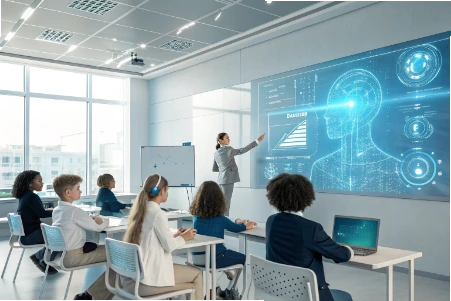
EDUCATION
AI in Classrooms: How Global Schools Are Redefining Personalized Learning in 2025
As education systems worldwide embrace the digital transformation era, artificial intelligence is emerging as the cornerstone of personalized learning—reshaping how teachers teach, students learn, and schools operate. From adaptive learning platforms to AI-driven assessments, 2025 marks a defining moment in the evolution of global education.
Reimagining the Learning Experience
Schools across the globe are leveraging AI to tailor education to individual student needs, learning styles, and pace. Smart algorithms now analyze real-time performance data to identify learning gaps, recommend targeted exercises, and even predict areas where students may struggle in the future.
In Finland, AI tutors are being integrated into national curriculums to provide one-on-one academic support, while schools in Singapore and the UAE have implemented AI dashboards that help educators monitor progress and design more personalized teaching strategies.
“AI is not replacing teachers—it’s redefining their role,” said an education technology advisor at UNESCO. “It’s giving them time to focus on mentorship, creativity, and emotional intelligence while automating repetitive academic tasks.”
Empowering Educators Through Data and Insight
AI’s greatest strength lies in its ability to process vast amounts of data and translate it into actionable insights. Educators are using these tools to craft individualized lesson plans, manage classroom diversity, and ensure that every learner—regardless of ability or background—receives tailored support.
Machine learning algorithms also help track behavioral patterns, engagement levels, and cognitive development, enabling schools to detect early signs of learning challenges and intervene before they escalate.
Bridging Global Education Gaps
In developing nations, AI-powered learning platforms are addressing teacher shortages and access inequalities. Mobile-based education tools—enhanced with natural language processing—are bringing quality learning experiences to remote and underserved communities.
Countries like India and Kenya are deploying low-bandwidth AI solutions to deliver interactive, multilingual content, ensuring that technology supports inclusivity rather than deepening digital divides.
Balancing Innovation with Ethics
However, experts caution that AI integration in classrooms must be balanced with ethical considerations. Data privacy, algorithmic bias, and equitable access remain pressing concerns. Policymakers are now working to ensure that the expansion of AI in education aligns with values of transparency, accountability, and human-centered learning.
The Future of Personalized Education
As global schools continue to redefine the boundaries of education, AI is proving to be not just a technological upgrade—but a philosophical shift toward empathy-driven, student-centric learning. The classrooms of 2025 reflect a new reality: one where machines personalize education, and teachers humanize it.




